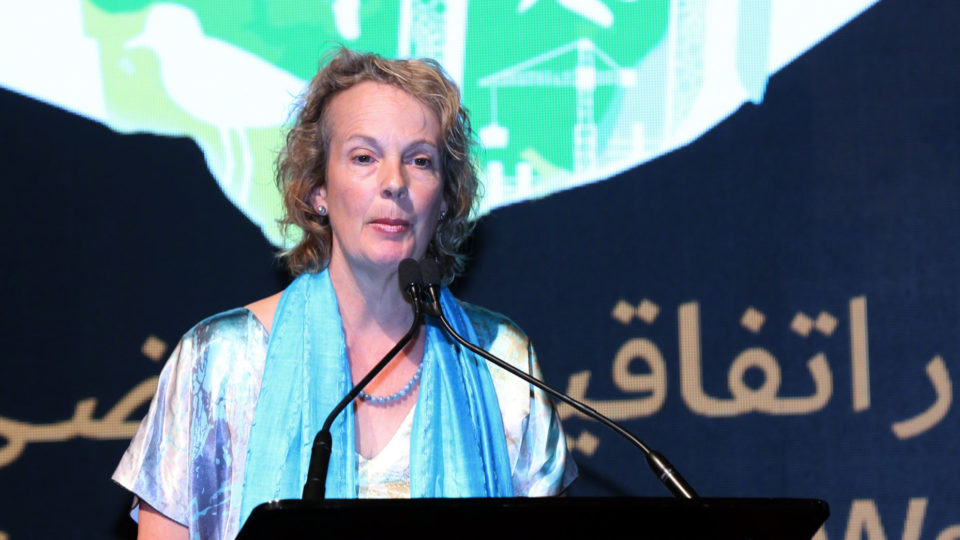Wetlands International attended the 13th Meeting of the Conference of the Contracting Parties to the Ramsar Convention on Wetlands (COP13) held in Dubai, UAE from 21-29 October 2018, with an enthusiastic delegation drawn from our different offices across the network- Europe, Asia, Latin America and Africa. The COP13 theme was “Wetlands for a Sustainable Urban Future” which provided a number of significant and timely opportunities for us to strengthen and extend the reach of the Convention to achieve improved wetland conservation and management, as a contribution to sustainable development. We had the opportunity to interact and engage with the participants , especially with the Contracting Parties to develop further joint actions that will help mainstream wetlands in sustainable development.
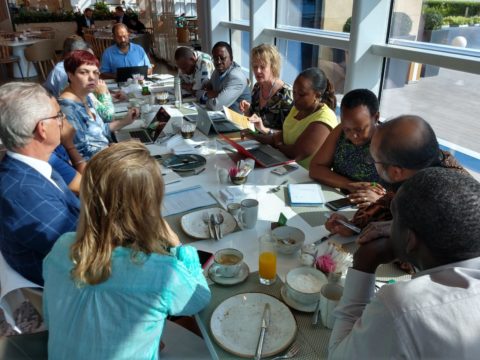
25 resolutions out of 26 were adopted Read more here.We had more than 1300 participants attending including delegates; contracting parties, observers and visitors. Wetlands International together with other partners organised 2 key side events and co-organised 16 others.Read more here As part of our commitment to supporting countries in implementing related resolutions of multilateral agreements, namely the Ramsar Convention, Convention on Migratory Species, and Convention on Biological Diversity Wetlands International Philippines organized a successful side-event on Conserving Intertidal Wetlands for Coastal Resilience with the Government of the Philippines and BirdLife International. The side-event was aimed at increasing the understanding and appreciation of the objectives of draft resolution 18.22 “Promoting the Conservation and Wise Use of Intertidal Wetlands and Ecologically-associated Habitats”. It was also an opportunity to highlighted the salient points of the draft Resolution and explain the vision for the proposed global coastal forum. The Participants identified the challenges and opportunities in coastal wetlands conservation and a panel of experts from different countries including Kenya provided insights on how the Resolution and the global coastal forum could assist in facing the challenges and in reducing the loss of intertidal wetlands.
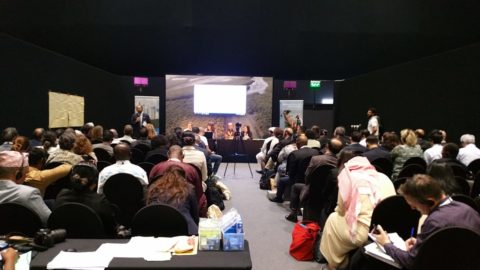
The second side event focused on Wetlands, Peace and Security. Participants at the event noted that this is a new issue and it is important to know more it. Experts in the panel discussion underscored the relevance of the issue for different stages of conflict, and different parts of the world. They reiterated that investments in safeguarding and restoring wetlands contribute to holding peace and helping people to stay in their wetlands. Senegal and Central African Republic submitted a Draft Resolution (18.19) on the importance of wetlands for peace and security. The resolution recognized the importance of “wetland security hotspots”, and inspired wise use, investment and collaboration around these areas. It provoked a lot of discussion and debate at the meeting and Senegal and Central African Republic decided to withdraw the Draft Resolution at the last moment and, so as to create more time to fortify the resolution
Ethiopia Delegation is keen on becoming a signatory to the convention
Ethiopia is currently not a signatory to the RAMSAR Convention. Wetlands International therefore started a dialogue with Ethiopian delegates on the added value of ratifying the convention including sponsoring the delegates to attend the RAMSAR COP 13. The Ethiopian delegates included representatives from Ministry of Water Irrigation and Energy and Ministry of Environment Forest and Climate . By attending the COP, they gained insights into how the different contracting parties and regional inititatives such as RAMCEA relate with RAMSAR and the convention. The delegation participated in plenary sessions and side events and also had several bilateral discussions with different stakeholders. From all these experiences, they realized the importance of the Ramsar convention. In addition they were impressed by the networks functioning in different regions to facilitate experience sharing and mobilising support for the conservation of wetlands for people and the nature.
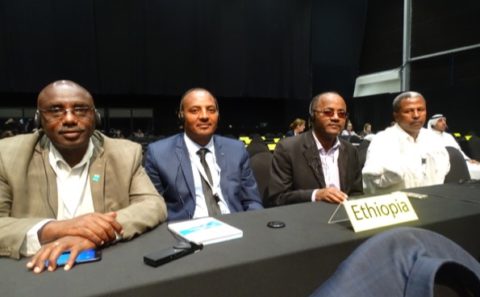
Calls for action from International Organisation Partners (IOPs)!
As the UN Secretary General Ban Ki Moon stated last week in The Hague speaking on climate adaptation,‘we are at a point of no return’ and ‘we must act now or regret it forever’” said Jane Madgwick who was speaking on behalf of the 6 globally operating NGOs (Wetlands International, BirdLife International, IUCN, Wildfowl and Wetlands Trust, WWF and the International Water Management Institute) – who are special institutional partners to the Ramsar Convention, working closely with the Contracting Parties. She further indicated that the world has become a more turbulent and uncertain place to live and catastrophic consequences of extreme weather events have increased. This means that the close link between the resilience of people, the changing climate and the resilience of ecosystems has come into sharper focus. Read more here
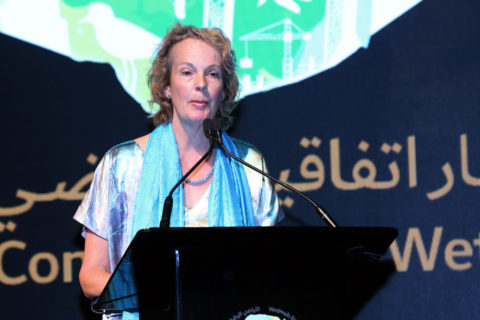
Global wetlands outlook
Speaking at the conference Martha Rojas Urrego, secretary general Ramsar Convention on Wetlands unveiled the Global Wetlands Outlook publication. She noted that this was the first time they produced the global outlook and the convention is hopeful that the publication will be critical in informing the conservation and management of wetlands. “Wetlands are being lost 3 times faster than forests. Since the 1970s we have lost 35% of the world’s wetlands. We need to work together to reverse this trend” she said. The Global Wetland Outlook and Citizen Science Global Wetland Survey also express the urgency and highlight just how critical improving the condition of wetlands is to meet the Global Goals for development and climate action. These important new pieces of evidence also point to a massive implementation gap. It is clear that an ever closer partnership between governments, businesses, indigenous people, local communities and NGO’s like ours will be part of the solution. Read more here

